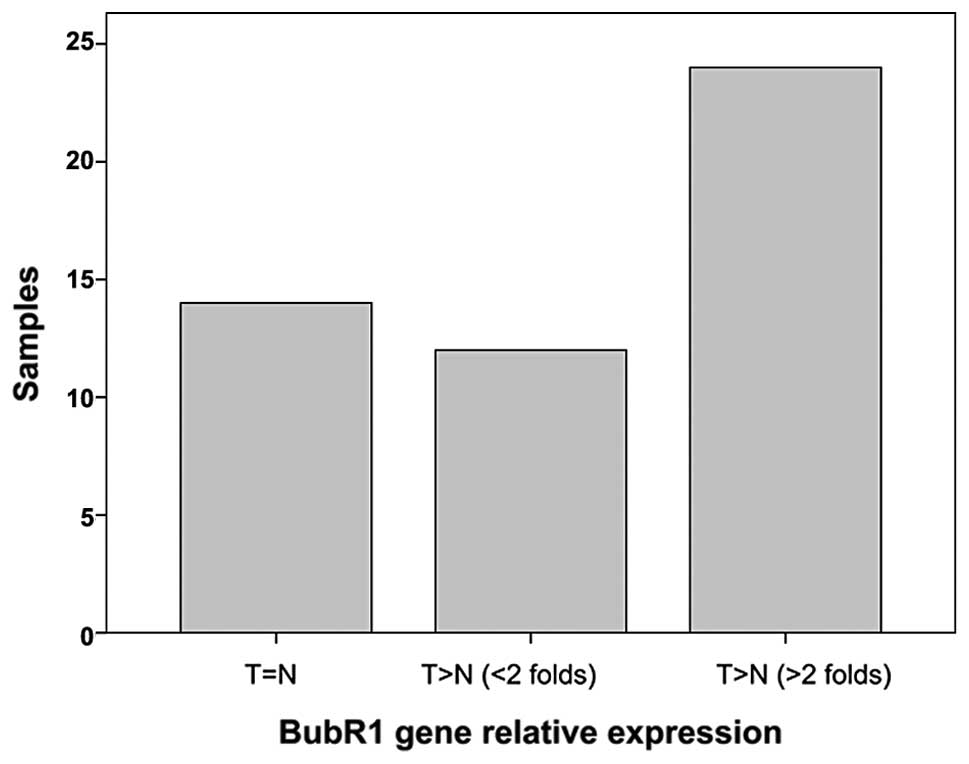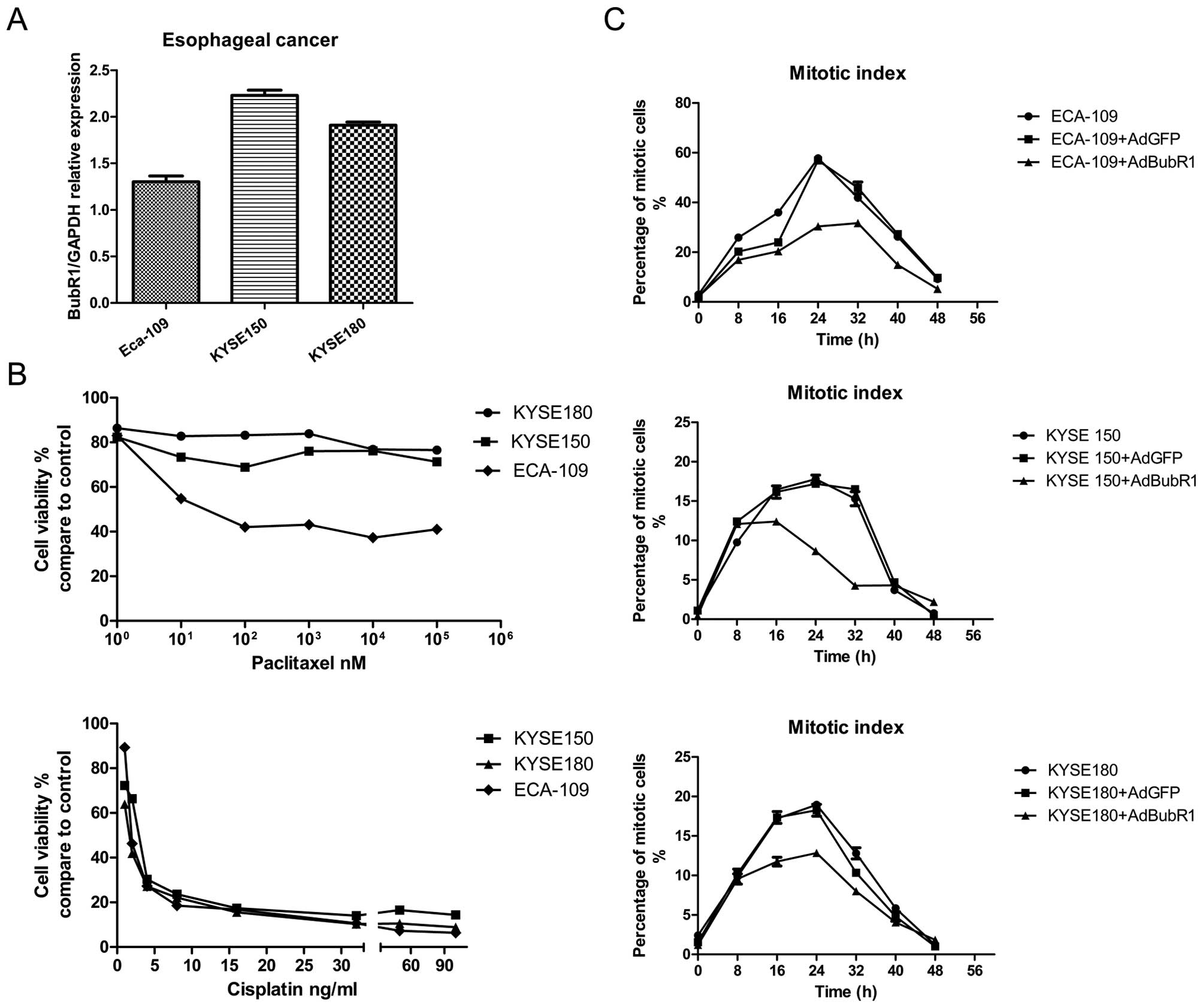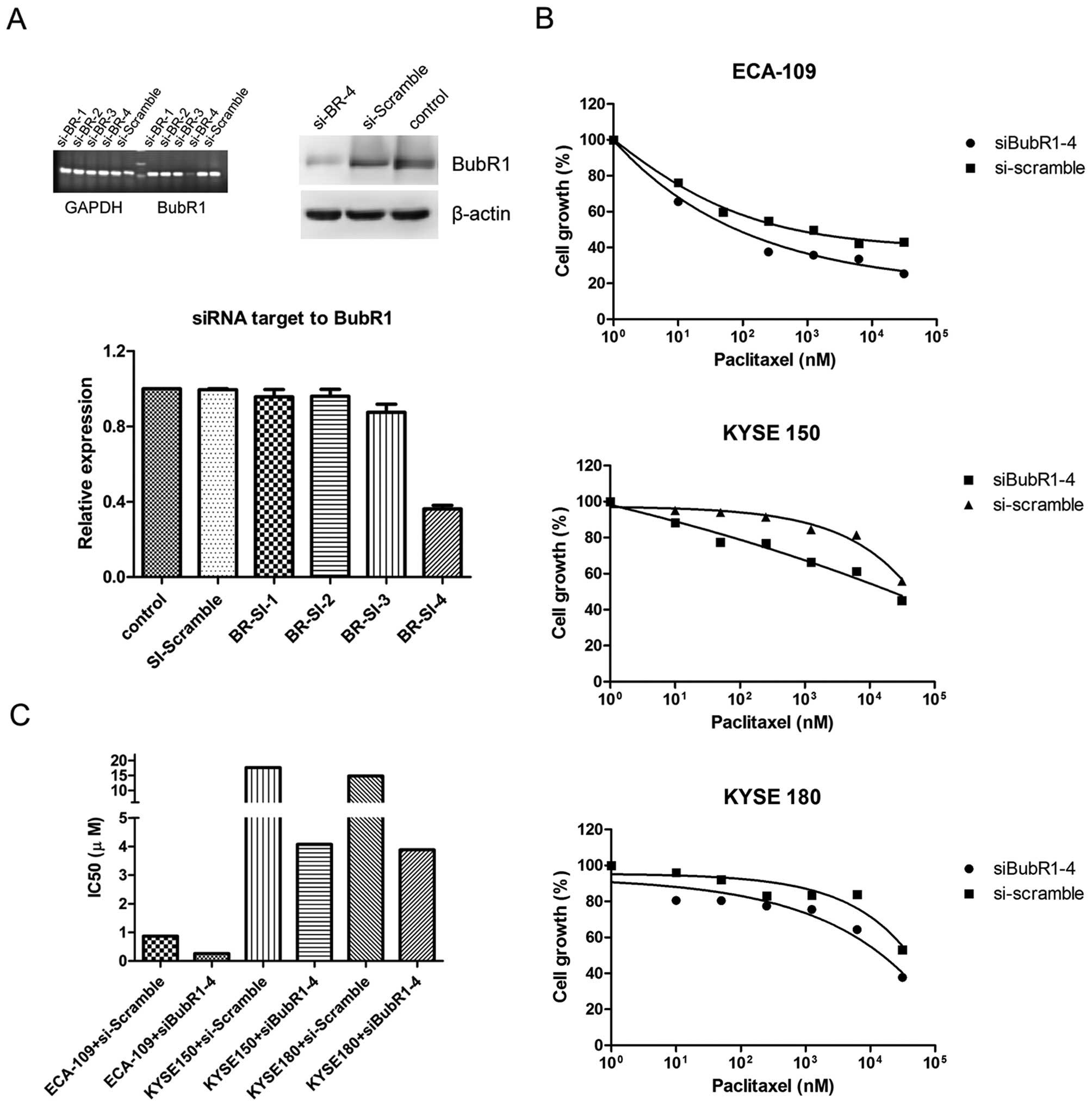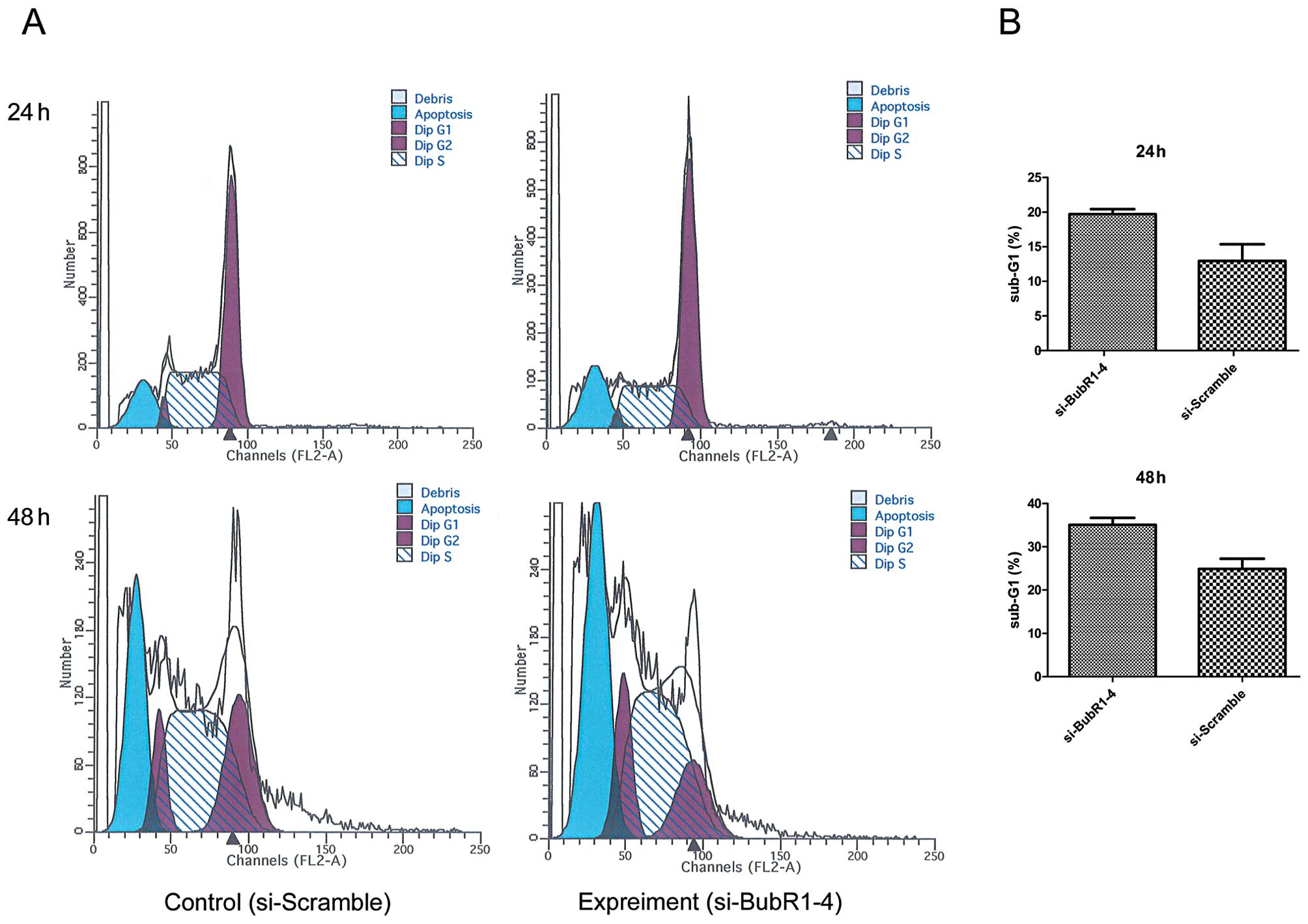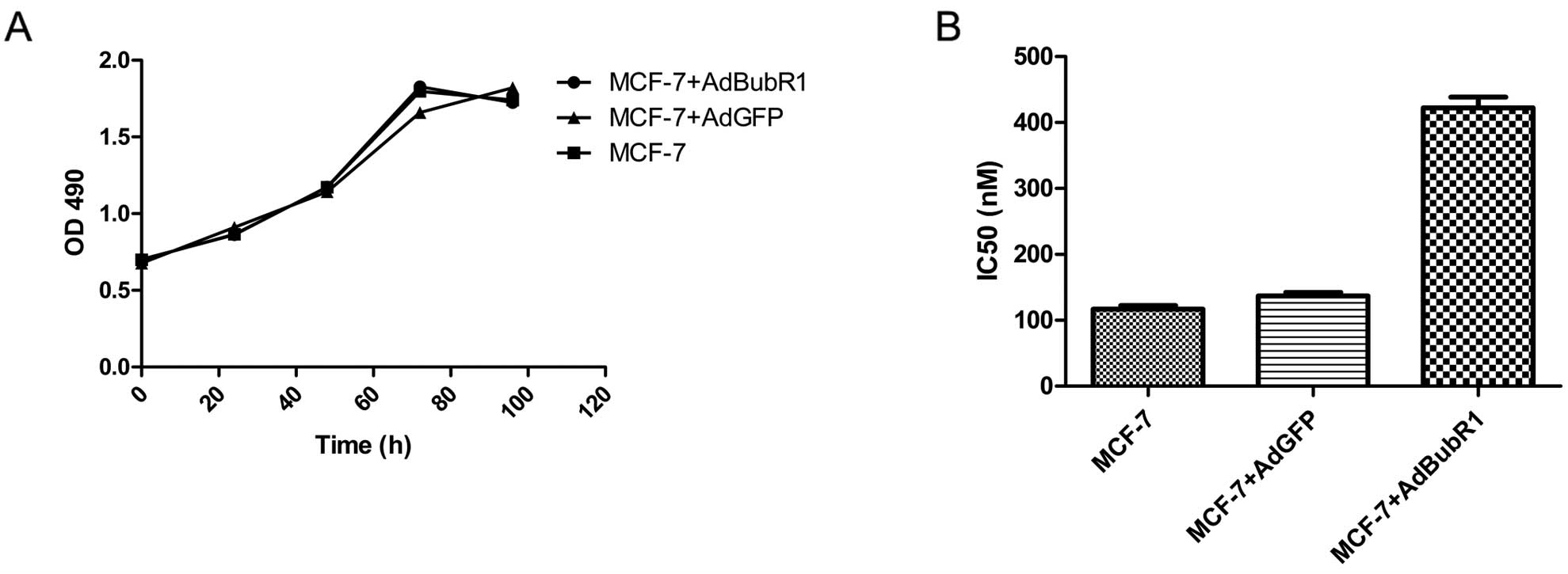|
1
|
Parkin DM: Global cancer statistics in the
year 2000. Lancet Oncol. 2:533–543. 2001.PubMed/NCBI
|
|
2
|
Stathopoulos GP and Tsiaras N:
Epidemiology and pathogenesis of esophageal cancer: management and
its controversial results (Review). Oncol Rep. 10:449–454.
2003.PubMed/NCBI
|
|
3
|
Musacchio A and Salmon ED: The
spindle-assembly checkpoint in space and time. Nat Rev Mol Cell
Biol. 8:379–393. 2007. View
Article : Google Scholar : PubMed/NCBI
|
|
4
|
Bolanos-Garcia VM and Blundell TL: BUB1
and BUBR1: multifaceted kinases of the cell cycle. Trends Biochem
Sci. 36:141–150. 2011. View Article : Google Scholar : PubMed/NCBI
|
|
5
|
Elowe S, Dulla K, Uldschmid A, Li X, Dou Z
and Nigg EA: Uncoupling of the spindle-checkpoint and
chromosome-congression functions of BubR1. J Cell Sci. 123:84–94.
2010. View Article : Google Scholar : PubMed/NCBI
|
|
6
|
Sotillo R, Hernando E, Díaz-Rodríguez E,
Teruya-Feldstein J, Cordón-Cardo C, Lowe SW and Benezra R: Mad2
overexpression promotes aneuploidy and tumorigenesis in mice.
Cancer Cell. 11:9–23. 2007. View Article : Google Scholar : PubMed/NCBI
|
|
7
|
Ricke RM, Jeganathan KB and van Deursen
JM: Bub1 overexpression induces aneuploidy and tumor formation
through Aurora B kinase hyperactivation. J Cell Biol.
193:1049–1064. 2011. View Article : Google Scholar : PubMed/NCBI
|
|
8
|
Yuan B, Xu Y, Woo JH, et al: Increased
expression of mitotic checkpoint genes in breast cancer cells with
chromosomal instability. Clin Cancer Res. 12:405–410. 2006.
View Article : Google Scholar : PubMed/NCBI
|
|
9
|
Yamamoto Y, Matsuyama H, Chochi Y, et al:
Overexpression of BUBR1 is associated with chromosomal instability
in bladder cancer. Cancer Genet Cytogen. 174:42–47. 2007.
View Article : Google Scholar : PubMed/NCBI
|
|
10
|
Ando K, Kakeji Y, Kitao H, et al: High
expression of BUBR1 is one of the factors for inducing DNA
aneuploidy and progression in gastric cancer. Cancer Sci.
101:639–645. 2010. View Article : Google Scholar : PubMed/NCBI
|
|
11
|
Lee YK, Choi E, Kim MA, Park PG, Park NH
and Lee H: BubR1 as a prognostic marker for recurrence-free
survival rates in epithelial ovarian cancers. Br J Cancer.
101:504–510. 2009. View Article : Google Scholar : PubMed/NCBI
|
|
12
|
Pinto M, Vieira J, Ribeiro FR, et al:
Overexpression of the mitotic checkpoint genes BUB1 and BUBR1 is
associated with genomic complexity in clear cell kidney carcinomas.
Cell Oncol. 30:389–395. 2008.PubMed/NCBI
|
|
13
|
Tanaka K, Mohri Y, Ohi M, et al: Mitotic
checkpoint genes, hsMAD2 and BubR1, in oesophageal squamous cancer
cells and their association with 5-fluorouracil and cisplatin-based
radiochemotherapy. Clin Oncol (R Coll Radiol). 20:639–646. 2008.
View Article : Google Scholar
|
|
14
|
Hanks S, Coleman K, Reid S, et al:
Constitutional aneuploidy and cancer predisposition caused by
biallelic mutations in BUB1B. Nat Genet. 36:1159–1161. 2004.
View Article : Google Scholar : PubMed/NCBI
|
|
15
|
Dai W, Wang Q, Liu T, et al: Slippage of
mitotic arrest and enhanced tumor development in mice with BubR1
haploinsufficiency. Cancer Res. 64:440–445. 2004. View Article : Google Scholar : PubMed/NCBI
|
|
16
|
Baker DJ, Perez-Terzic C, Jin F, et al:
Opposing roles for p16Ink4a and p19Arf in senescence and ageing
caused by BubR1 insufficiency. Nat Cell Biol. 10:825–836. 2008.
View Article : Google Scholar : PubMed/NCBI
|
|
17
|
Baker DJ, Jeganathan KB, Cameron JD, et
al: BubR1 insufficiency causes early onset of aging-associated
phenotypes and infertility in mice. Nat Genet. 36:744–749. 2004.
View Article : Google Scholar : PubMed/NCBI
|
|
18
|
Kim M, Murphy K, Liu F, Parker SE, Dowling
ML, Baff W and Kao GD: Caspase-mediated specific cleavage of BubR1
is a determinant of mitotic progression. Mol Cell Biol.
25:9232–9248. 2005. View Article : Google Scholar : PubMed/NCBI
|
|
19
|
Sudo T, Nitta M, Saya H and Ueno NT:
Dependence of paclitaxel sensitivity on a functional spindle
assembly checkpoint. Cancer Res. 64:2502–2508. 2004. View Article : Google Scholar : PubMed/NCBI
|
|
20
|
Lee EA, Keutmann MK, Dowling ML, Harris E,
Chan G and Kao GD: Inactivation of the mitotic checkpoint as a
determinant of the efficacy of microtubule-targeted drugs in
killing human cancer cells. Mol Cancer Ther. 3:661–669.
2004.PubMed/NCBI
|
|
21
|
Fu Y, Ye D, Chen H, Lu W, Ye F and Xie X:
Weakened spindle checkpoint with reduced BubR1 expression in
paclitaxel-resistant ovarian carcinoma cell line SKOV3-TR30.
Gynecol Oncol. 105:66–73. 2007. View Article : Google Scholar : PubMed/NCBI
|
|
22
|
Yamada HY and Gorbsky GJ: Inhibition of
TRIP1/S8/hSug1, a component of the human 19S proteasome, enhances
mitotic apoptosis induced by spindle poisons. Mol Cancer Ther.
5:29–38. 2006. View Article : Google Scholar : PubMed/NCBI
|
|
23
|
Shin HJ, Baek KH, Jeon AH, et al: Dual
roles of human BubR1, a mitotic checkpoint kinase, in the
monitoring of chromosomal instability. Cancer Cell. 4:483–497.
2003. View Article : Google Scholar : PubMed/NCBI
|
|
24
|
Luo J, Deng Z-L, Luo X, et al: A protocol
for rapid generation of recombinant adenoviruses using the AdEasy
system. Nat Protoc. 2:1236–1247. 2007. View Article : Google Scholar : PubMed/NCBI
|
|
25
|
Hannisdal K, Burum-Auensen E, Schjolberg
A, De Angelis PM and Clausen OP: Correlation between reduced
expression of the spindle checkpoint protein BubR1 and bad
prognosis in tonsillar carcinomas. Head Neck. 32:1354–1362. 2010.
View Article : Google Scholar : PubMed/NCBI
|
|
26
|
Rao CV, Yang YM, Swamy MV, et al: Colonic
tumorigenesis in
BubR1+/−ApcMin/+ compound
mutant mice is linked to premature separation of sister chromatids
and enhanced genomic instability. Proc Natl Acad Sci USA.
102:4365–4370. 2005.PubMed/NCBI
|
|
27
|
Seike M, Gemma A, Hosoya Y, et al: The
promoter region of the human BUBR1 gene and its expression analysis
in lung cancer. Lung Cancer. 38:229–234. 2002. View Article : Google Scholar : PubMed/NCBI
|
|
28
|
Menssen A, Epanchintsev A, Lodygin D, et
al: c-MYC delays prometaphase by direct transactivation of MAD2 and
BubR1: identification of mechanisms underlying c-MYC-induced DNA
damage and chromosomal instability. Cell Cycle. 6:339–352. 2007.
View Article : Google Scholar : PubMed/NCBI
|
|
29
|
Park HY, Jeon YK, Shin HJ, et al:
Differential promoter methylation may be a key molecular mechanism
in regulating BubR1 expression in cancer cells. Exp Mol Med.
39:195–204. 2007. View Article : Google Scholar : PubMed/NCBI
|
|
30
|
Wu YC, Yen WY and Yih LH: Requirement of a
functional spindle checkpoint for arsenite-induced apoptosis. J
Cell Biochem. 105:678–687. 2008. View Article : Google Scholar : PubMed/NCBI
|















